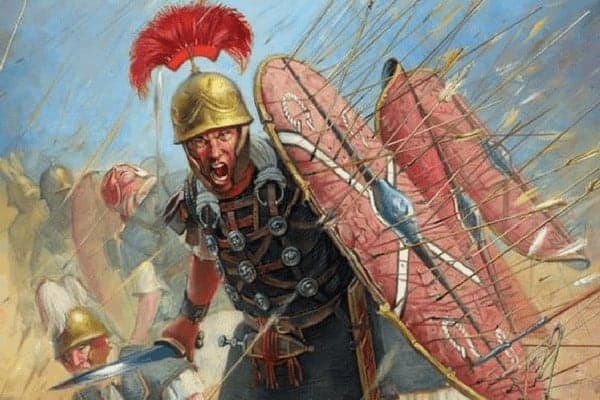There is no higher military honor in the U.S. than the Medal of Honor, and only 19 men have won the award twice. The Romans had a whole host of awards for bravery and courage. In fact, Polybius, the Greek historian who lived in Rome, thought that the wealth of possible awards and the reverence they were given very likely gave the Romans part of that extra fighting spirit that allowed them to conquer the Mediterranean.
Roman Crowns: Not Just for Kings
Where the average medal in modern history has been just that, a medal to be pinned or worn around the neck, Roman awards were mostly types of crowns. A great naval victory might be awarded with the Naval Crown (Corona Navalis), a golden crown with small prows/rams of ships all along as decoration.

Many of the crowns were gold, but the two most prestigious were made of oak or grass. The Grass Crown (Corona Obsidionalis) was the hardest to obtain. It was awarded to a general who broke a siege or otherwise saved a trapped army and drove the enemy from the field. The saved army would gather grass and twigs from the field to make the honored crown.
Since the average soldier could not have the opportunity to win the grass crown, the Civic Crown (Corona Civica) was the highest honor one could achieve. It’s not really a direct equivalent but held in similar esteem. A bit more specific than a Medal of Honor, to win a Civic Crown a soldier had to save a fellow Roman soldier and kill the enemy that had nearly killed the citizen. Furthermore, the hero had to stand his ground or advance forward from that spot.
Sounds fairly straightforward, except the saved man had to give personal testimony for the award to even be considered. Romans did not like to admit that they needed to be saved by someone else. Also, the saved man was then expected to treat his savior in almost every way as an elder and father figure, on top of owing a life debt. So, most men wouldn’t get the award even if they did save someone.
Spurius Ligustinus: A Man of Humblest Origins
But Spurius Ligustinus was a different sort of soldier. A relatively poor man for army service, Spurius had just one jugerum of farmland, about half the size of a modern football pitch, and served before the reforms of Marius that allowed the poor to join the army in droves. Spurius was of Sabine origin, meaning he descended from the hill tribes of the Apennine mountains that run through central Italy. These fierce people gave the Romans the hardest fights on their road to conquering Italy.

Joining in 200 BCE, it would have seemed that Spurius just missed out on the greatest war Rome had seen, the Second Punic War against Hannibal (218-201), but the almost endless conflict would dominate the next several decades.
The first campaign was against the Macedonians and Philip V. Philip had been expanding Macedon again and was threatening to take over all of the Greek cities. Rome intervened and three years later they would win a decisive battle against the feared and famed Macedonian Phalanx.
Spurius served in the Hastati, which was the front line of Rome’s three-line infantry formation. The Hastati were younger men in the best fighting shape and the idea was to gain experience early, with those surviving several years moving to the middle line of Princeps. Spurius would be promoted to Centurion of one of Hastati’s maniples before the decisive battle of Cynoscephalae.

